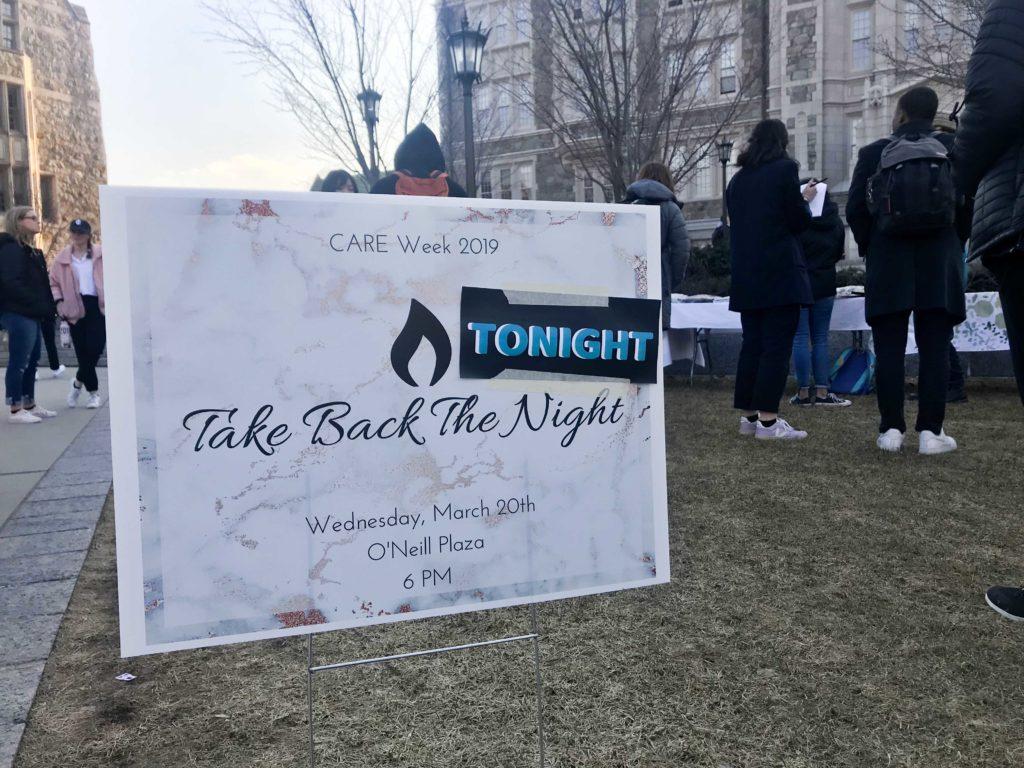Small flickers of tea lights swept the grounds of O’Neill Plaza, shining out from the hands of the Boston College students who had assembled in front of the library. Following a pledge of solidarity, participants of “Take Back the Night” opened their previously closed eyes to see O’Neill Plaza awash with faint light. The lit candles—the final portion of “Take Back the Night”—represented a show of support “to break the silence surrounding sexual violence.”
“Take Back the Night” is an annual, worldwide event in pursuit of diminishing the stigma and silence about instances of sexual violence. Every year, the BC Women’s Center sponsors the event, inviting students to listen to accounts of sexual violence survivors and songs from BC-based a cappella groups as part of Concerned About Rape Education (CARE) Week.
This year, students gathered around 6 p.m. in front of O’Neill Library, first greeted by Maggie Haesler, director of “Take Back the Night” and Lynch ’19. To kick off the program, Haesler encouraged students to take this night as a signal to “reflect, heal, and advocate for change” against sexual violence. Haesler, who has been involved with the Women’s Center since freshman year, focused on the survivors of instances of sexual violence while planning this event.
“When planning an event that has to do with survivorship it’s really important to … keep that at the forefront of every decision,” Haesler said.
Following Haesler’s introductory remarks, the Women’s Center invited Andrés Castro Samayoa to the stage. Samayoa, an assistant professor in the Lynch School of Education and Human Development, is a first-generation queer immigrant of El Salvador. His academic research focuses on collegiate environments and the ability for those spaces to be a source of civic support in under-resourced communities of color.
As an adolescent, Samayoa experienced oppression rooted in his identity—citing gender violence in his home country of El Salvador and in his own family. His self-described “feminist awakening” as a queer individual pushed him to want to recognize previously unheard voices, and, in this case, the voices of sexual violence survivors, mentioning the importance of events like “Take Back the Night.”
“We need these spaces for healing. We need these spaces for nourishment. We need these spaces,” Samayoa said.
Samayoa’s address was followed by accounts of sexual violence survivors. Three survivors each took to the podium to share their stories—The Heights does not print the names of sexual violence survivors and the trio’s names were not revealed at the event. One woman, voice trembling, thanked her friends for staying by her side as she grappled with her sexual assault—she never thought it would happen to her. The next shared her path to healing and the bumps along the way. And the last relayed her story through a poem. Between each student speaker, The Sharps, an all-female a capella group, and Black Experience in America Through Song (B.E.A.T.S.), an R&B and soul group, sang uplifting and supporting songs in tune with the night’s message.
To close the program, Michael Osaghae, MCAS ’20, and Tiffany Brooks, MCAS ’21, the incoming president and vice president of the Undergraduate Government of BC, respectively, encouraged attendees to participate in a solidarity pledge. With a series of “I” statements, Osaghae, Brooks, and Taraun Frontis, UGBC vice president of diversity and inclusion and MCAS ’19, asked students to close their eyes. Using the small tea lights passed around throughout the program, the UGBC representatives recited the statements, asking again for students to flicker their tea lights on and off in agreement with the statements. In a demonstration of shared solidarity with victims of sexual violence, students opened their eyes to reveal a brightly lit O’Neill Plaza.
Osaghae, Brooks, and Frontis also outlined a call-to-action for “Take Back the Night” attendees. Brooks encouraged all those in attendance to stand up, speak out, and believe in perceptions of sexual violence while Frontis promoted the continuation of bystander intervention and volunteering at the Boston Area Rape Crisis Center.
“Take Back the Night” served as the spiritual introduction to Sexual Assault Awareness Month, which begins on April 1.
Haesler expressed her optimism toward events like “Take Back the Night” and all of the events promoted by the Women’s Center during CARE Week.
“Together we can end sexual violence,” Haesler said.
Featured Image by Isabella Cavazzoni / Heights Editor



















